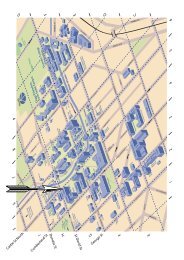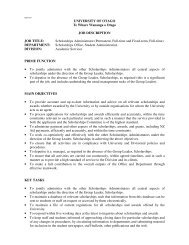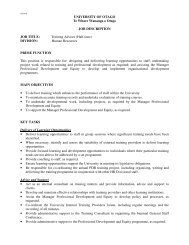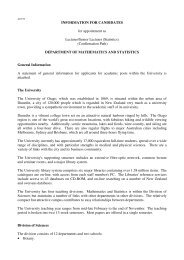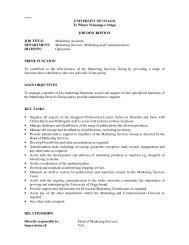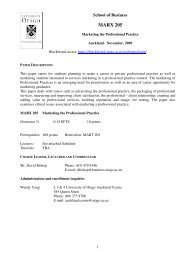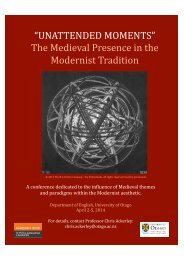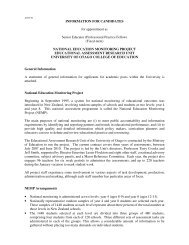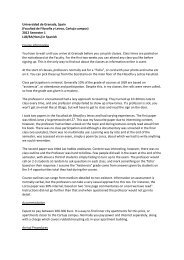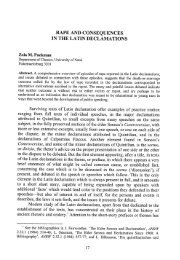scholia - University of Otago
scholia - University of Otago
scholia - University of Otago
You also want an ePaper? Increase the reach of your titles
YUMPU automatically turns print PDFs into web optimized ePapers that Google loves.
44 Scholia ns Vol. 6 ( 1997) 34-48 ISSN I 018-9017<br />
175)? 6 This is only one <strong>of</strong> several ways in which the structure <strong>of</strong> the mythical<br />
section follows that <strong>of</strong> the whole poem. After the lengthy introduction that is<br />
Heracles' descent (56-77), the poem's central section falls into three<br />
subsections-the first-person narrative <strong>of</strong> Meleager's sufferings (93-154)<br />
enclosed within two shorter sections in which Meleager and Heracles converse<br />
(78-92 and 155-75). These, moreover, conform to the same chiastic<br />
arrangement which we saw in the structure <strong>of</strong> the poem as a whole-Meleager<br />
speaks first (78-84) and Heracles replies (84-92), while after Meleager's tale it<br />
is Heracles who speaks first (159-69) and Meleager who replies (170-75). The<br />
effect <strong>of</strong> this chiasmus in highlighting Meleager's narrative as the ode's central<br />
element is reinforced by the stress at its beginning and its end on the tears <strong>of</strong><br />
the heroes: Heracles' musings on the purposes <strong>of</strong> Hera and Athena provoke<br />
tears in Meleager (94), as he remembers the effects <strong>of</strong> divine purpose in his<br />
own case, and these are recalled first in his own description <strong>of</strong> his weeping as<br />
his life ebbs away (153f.) and then in Heracles' tears <strong>of</strong> sympathy (155-58);<br />
these details, serving as virtual quotation marks round Meleager's speech, in<br />
themselves contribute to the pathos which is the myth's (intended) effect; the<br />
fact that tears <strong>of</strong> resignation and melancholy at one's own loss are answered by<br />
and evoke tears in recognition <strong>of</strong> shared humanity is presumably no less<br />
significant.<br />
Chiastic focus on the ode's central 'event' is thus evident; 37 but the<br />
appearance <strong>of</strong> mechanical formalism is avoided by the preservation <strong>of</strong> a natural<br />
sequence <strong>of</strong> statement and counter-statement. Though Meleager's narrative<br />
takes centre stage, it is introduced as a response to Heracles' remarks (93f.) and<br />
itself elicits Heracles' reply (159); thus something <strong>of</strong> the alternating rhythm<br />
which we noticed in the ode's opening section is detectable. This is yet more<br />
evident in Meleager's speech itself. Though one might discern an external<br />
conceptual ring enclosing the speech (in so far as it is an answer to Heracles'<br />
question, 'Who killed you?' [89], and so its climax in Meleager's death<br />
completes the frame), the narrative itself falls into two distinct phases (the first,<br />
104-20, describing the struggle against the boar, and the second, 124-54,<br />
continuing the tale with the war against the Curetes and the circumstances <strong>of</strong><br />
Meleager's death), each preceded by a reference to the cause <strong>of</strong> aH the trouble,<br />
the anger <strong>of</strong> Artemis (94-104, 121-24). Thus Artemis' anger rings the first<br />
phase <strong>of</strong> the narrative, but the last element <strong>of</strong> this ring becomes the prelude to a<br />
second phase <strong>of</strong> the narrative which balances the first. These two phases,<br />
however, are still linked by ring-composition: the initiation <strong>of</strong> the train <strong>of</strong><br />
36 Maehler [3] 83f.<br />
37 Cf. the focus on Croesus' speech (37-46) in Ode 3, with Maehler [3] 39.



